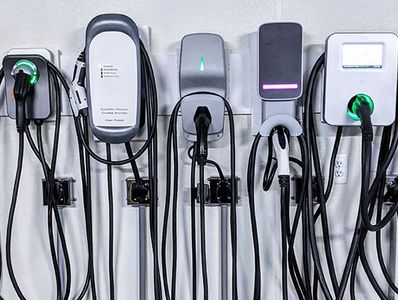EV (Electric Vehicle) Charger
We Take 'Charge' Of Our Installations
Let's face it, Electrical Vehicles are here to stay with many more on the way. What does every electric vehicle need? It needs a charger of course!
Maybe you have a new EV purchased or maybe you've moved and need it relocated to your new location? From your basic Wall Charger to your 240v Fast Charger, Whatever your needs are, SBG Electrical has you covered.
We stock many types and sizes of chargers for our customers convenience. Got your own charger? That okay too! We often install customer supplied chargers and do it in the most professional manner.
SAVE 10$ on your EV Charger Installation
Levels of EV Chargers
Level 1 Charging: 120-Volt
Level 3 Charging: 347V - 600v (DC Fast Charge & Supercharging)
Level 2 Charging: 208-Volt to 240-Volt
"Level 1 charging uses a common 120-volt household outlet. Every electric vehicle or plug-in hybrid can be charged on Level 1 by plugging the charging equipment into a regular wall outlet. Level 1 is the slowest way to charge an EV. It adds between 3 and 5 miles of range per hour.
Level 1 charging works well for plug-in hybrid electric vehicles (PHEVs) because they have smaller batteries, currently less than 25 kWh. Since EVs have much larger batteries, Level 1 charging is too slow for most daily charging, unless the vehicle isn’t needed to drive very far on a daily basis. Most BEV owners find that Level 2 charging better suits their daily charging needs"
Connectors Used: J1772, Tesla
Charging Speed: 5 to 8.5 km Per Hour
Locations: Home, Workplace & Public
Level 2 Charging: 208-Volt to 240-Volt
Level 3 Charging: 347V - 600v (DC Fast Charge & Supercharging)
Level 2 Charging: 208-Volt to 240-Volt
"Level 2 charging is the most commonly used level for daily EV charging. Level 2 charging equipment can be installed at home, at the workplace, as well as in public locations like shopping plazas, train stations and other destinations. Level 2 charging can replenish between 20 and 130 km of range per hour, depending on the power output of the Level 2 charger, and the vehicle’s maximum charge rate.
Most BEV owners choose to install Level 2 charging equipment at their residence, because it charges the vehicle up to 10 times faster than Level 1 charging. Charging from a Level 2 source usually means the vehicle will be completely charged overnight, even if you plugged with a nearly empty battery.
Level 2 chargers can deliver up to 80 amps of power. But that requires a 100-amp 208-240V dedicated circuit and a heavy, costly supply line from the breaker box. Most owners will be well served choosing a 40-amp charger that can deliver 9.6 kW to the EV. A 48-amp charger can charge slightly faster at 11.5 kW, but requires a heavier gauge wire and the charger must be hardwired to comply with the NEC code. Therefore, 48-amp chargers can cost significantly more than a 40-amp unit and offer only marginally faster charging"
Connectors Used: J1772, Tesla
Charging Speed: 20 to 130 kms Per Hour
Locations: Home, Workplace & Public
Level 3 Charging: 347V - 600v (DC Fast Charge & Supercharging)
Level 3 Charging: 347V - 600v (DC Fast Charge & Supercharging)
Level 3 Charging: 347V - 600v (DC Fast Charge & Supercharging)
"Level 3 charging is the fastest type of charging available and can recharge an EV at a rate of 5 to 32 km of range per minute. Unlike Level 1 and Level 2 charging that uses alternating current (AC), Level 3 charging uses direct current (DC). The voltage is also much higher than Level 1 & 2 charging, which is why you don’t see level 3 chargers installed at home. Very few residential locations have the high-voltage supply that is required for level 3 charging.
Additionally, DC Fast Chargers cost tens of thousands of dollars. So even if your residence has 400-volt electricity service, the cost to install the charger would most likely cost more than your EV. Tesla calls their Level 3 chargers Superchargers; others are called DC Fast Chargers"
Connectors Used: Combined Charging System (Combo), CHAdeMO & Tesla
Charging Speed: 5 to 32 km Per Minute
Locations: Public
40 Pinegrove Dr, Paradise, NL A1L 1B8, Canada
© 2015 SBG Electrical - All Rights Reserved.
